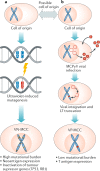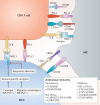The biology and treatment of Merkel cell carcinoma: current understanding and research priorities
- PMID: 30287935
- PMCID: PMC6319370
- DOI: 10.1038/s41571-018-0103-2
The biology and treatment of Merkel cell carcinoma: current understanding and research priorities
Abstract
Merkel cell carcinoma (MCC) is a rare and aggressive skin cancer associated with advanced age and immunosuppression. Over the past decade, an association has been discovered between MCC and either integration of the Merkel cell polyomavirus, which likely drives tumorigenesis, or somatic mutations owing to ultraviolet-induced DNA damage. Both virus-positive and virus-negative MCCs are immunogenic, and inhibition of the programmed cell death protein 1 (PD-1)-programmed cell death 1 ligand 1 (PD-L1) immune checkpoint has proved to be highly effective in treating patients with metastatic MCC; however, not all patients have a durable response to immunotherapy. Despite these rapid advances in the understanding and management of patients with MCC, many basic, translational and clinical research questions remain unanswered. In March 2018, an International Workshop on Merkel Cell Carcinoma Research was held at the US National Cancer Institute, at which academic, government and industry experts met to identify the highest-priority research questions. Here, we review the biology and treatment of MCC and report the consensus-based recommendations agreed upon during the workshop.
Conflict of interest statement
The International Workshop for Merkel Cell Carcinoma Research, which included activities related to the preparation of this Consensus Statement, was supported by funding from Bristol-Myers Squibb (BMS), EMD Serono, the US National Cancer Institute and the US National Institute of Arthritis and Musculoskeletal and Skin Diseases. J.C.B. has received honoraria from Amgen, Merck Serono and Pfizer; he has received advisory board honoraria from Amgen, CureVac, eTheRNA, Lytix, Merck Serono, Novartis, Rigontec and Takeda; and he has received research funding from Boehringer Ingelheim, BMS and Merck Serono. S.B. reports research funding to his institution (the University of Washington, WA, USA) from Merck, BMS, EMD Serono, ImmuneDesign, NantKwest and Oncosec. S.B. has received honoraria for participation in advisory boards from EMD Serono and Genentech. S.P.D. has received consulting and travel support from EMD Serono. J.K. and M.H. are full-time employees of EMD Serono. M.M. is a full-time employee of Foundation Medicine. P.N. is a consultant of EMD Serono and Merck and reports research funding to his institution (the University of Washington, WA, USA) from BMS and EMD Serono. G.R. is an advisory board member and/or consultant of EMD Serono and Pfizer and owns stocks in Regeneron and Syros Pharmaceuticals. M.R. has served on the advisory boards of Merck and Novartis. M.T.T. serves on the advisory boards of Novartis, Myriad Genetics and Seattle Genetics. R.T. has received honoraria from Merck Serono. D.M.T. is a full-time employee of MedImmune. M.K.K.W. serves on the advisory boards of EMD Serono, Merck and Pfizer. The other authors and consortia members declare no competing interests.
Figures




References
-
- Toker C. Trabecular carcinoma of the skin. Arch. Dermatol. 1972;105:107–110. - PubMed
-
- Agelli M, Clegg LX, Becker JC, Rollison DE. The etiology and epidemiology of merkel cell carcinoma. Curr. Probl. Cancer. 2010;34:14–37. - PubMed
-
- Harms PW. Update on Merkel cell carcinoma. Clin. Lab. Med. 2017;37:485–501. - PubMed
Publication types
MeSH terms
Substances
Grants and funding
LinkOut - more resources
Full Text Sources
Other Literature Sources
Research Materials
Miscellaneous

